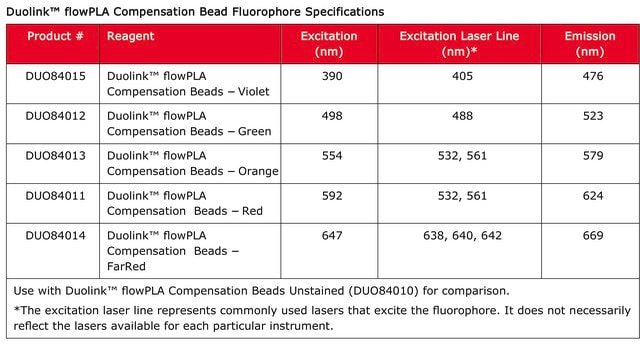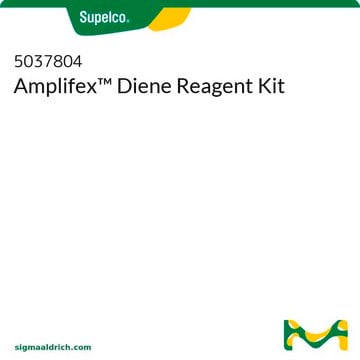DUO84011
Duolink® flowPLA Compensation Beads - Red
For flow cytometry standard and multiplex analysis
About This Item
Empfohlene Produkte
Qualitätsniveau
Produktlinie
Duolink®
Form
slurry
Methode(n)
flow cytometry: suitable
immunocytochemistry: suitable
immunofluorescence: suitable
multiplexing: suitable
proximity ligation assay: suitable
Fluoreszenz
λex 592 nm; λem 624 nm (excitation laser line 532, 561 nm)
Eignung
suitable for fluorescence
Versandbedingung
wet ice
Lagertemp.
2-8°C
Anwendung
It is recommended that Duolink® compensation beads should be used when performing a multiplexed experiment (DUO96001) to save on time and reagent cost, rather than using precious sample. This product can be used to determine flow cytometry instrumentation collection parameters, inform experimental design, and as a control for compensation data for multiplexed FlowPLA experiments.
Visit our Duolink® PLA Resource Center for information on how to run a Duolink® experiment, applications, troubleshooting, and more.
To perform a complete Duolink® PLA in situ experiment you will need two primary antibodies (PLA, IHC, ICC or IF validated) that recognize two target epitopes. Other necessary reagents include a pair of PLA probes from different species (one PLUS and one MINUS), detection reagents, wash buffers, and mounting medium. Note that the primary antibodies must come from the same species as the Duolink® PLA probes. Analysis is carried out using standard flow cytometry equipment. Duolink® Multicolor flow PLA Reagent Pack Kits used with Duolink® flowPLA experiment, you will need fixed and permeabilized suspended cells, and at least two primary antibodies that specifically recognize your proteins of interest. Analysis is carried out using standard flow cytometry assay equipment. User must provide a fixed cell suspension and primary antibodies. Test your primary antibodies (IgG-class, mono- or polyclonal) in a standard immunofluorescence (IF), immunohistochemistry (IHC) or immunocytochemistry (ICC) assay to determine the optimal fixation, blocking, and titer conditions. Duolink® in situ reagents are suitable for use on fixed cells, cytospin cells, cells grown on slide, formalin-fixed, paraffin embedded (FFPE), or tissue (fresh or frozen). Flow validated antibodies are recommended.
View full Duolink® product list
Leistungsmerkmale und Vorteile
- Save time and reagent cost by utilizing beads for compensation rather than precious sample and multiplex reagents
- No overexpression or genetic manipulation required
- High specificity (fewer false positives)
- Single molecule sensitivity due to rolling circle amplification
- Relative quantification possible
- No special equipment needed
- Quicker and simpler than FRET
- Increased accuracy compared to co-IP
- Publication-ready results
Komponenten
6.0 - 8.0μm polystyrene beads suitable for use in flow cytometry assays. The bead slurry should have a concentration of 1.5-3.0 million beads/mL. Red beads can be mixed with the negative control compensation (DUO84010), or collected alone.
Rechtliche Hinweise
Lagerklassenschlüssel
12 - Non Combustible Liquids
WGK
WGK 1
Hier finden Sie alle aktuellen Versionen:
Analysenzertifikate (COA)
Leider sind derzeit keine COAs für dieses Produkt online verfügbar.
Wenn Sie Hilfe benötigen, wenden Sie sich bitte an Kundensupport
Besitzen Sie dieses Produkt bereits?
In der Dokumentenbibliothek finden Sie die Dokumentation zu den Produkten, die Sie kürzlich erworben haben.
Unser Team von Wissenschaftlern verfügt über Erfahrung in allen Forschungsbereichen einschließlich Life Science, Materialwissenschaften, chemischer Synthese, Chromatographie, Analytik und vielen mehr..
Setzen Sie sich mit dem technischen Dienst in Verbindung.







